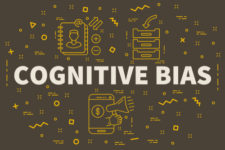How Cognitive Bias Can Lead to Wrongful Convictions

How many of us have watched reports of high-profile cases on the news and, when the suspect is found guilty, declared that we “knew all along”?
Or been concerned about walking down a dark alleyway, but not given a second thought to driving home in a car – even though the latter is statistically far less safe?
These are just a couple of examples of “cognitive biases” – errors in perception, believed to be caused by mental shortcuts, known as “heuristics”.
Researchers suggest that in a single day, we may have as many as 60-80,000 thoughts and process the equivalent of 34 gigabytes of information. Some Psychologists believe we use heuristics subconsciously to manage these vast amounts of data, and thereby make quick but often inaccurate judgements.
Although they are largely useful, when it comes to criminal investigations and proceedings, heuristics can be dangerous – erroneously influencing our perception of someone’s guilt or innocence. Indeed, countless studies suggest that juries are biased and often reach conclusions based not on the evidence, but on heuristics-based judgements.
Here we explore some of the categories of heuristics and how – according to the research – they may lead to injustices for those accused of criminal offences.
Representativeness heuristic
The theory of representativeness heuristic postulates that the closer something appears to an archetype or stereotype, the more likely we are to form the view they behave in that manner.
So, for example, if a defendant fits the stereotype of a “criminal” as portrayed in the media, we are more likely to be convinced that they indeed a criminal, and presume they are guilty of an offence.
Indeed, studies suggest that participants are more likely to find those who are less “attractive” and/or from a lower socioeconomic status guilty of an offence, than a person who is perceived as attractive and wealthy. This, researchers suggest, is at least partly due to media stereotyping.
Affect heuristic
The notion of affect heuristic posits that we tend to find something truer or more likely if it evokes a strong emotional reaction from us.
In a 1997 study by Kimihiko Yamagishi, people who were told a disease kills 1286 out of every 10,000 people rated the disease as more dangerous than those who were told it kills 24.12% of the population – although the statistics are identical.
The author found that the reference to “people” rather than a “percentage of the population” evoked a stronger emotional response, causing participants to perceive the disease as deadlier.
It was found that crimes against the person – especially those against children – tend to evoke far stronger reactions in people than those against property, and that a jury is more likely to summarily judge a defendant as “guilty” of a crime such as an assault or sexual assault than a crime such as damaging property.
Confirmation bias
Confirmation bias is the idea that if we hold a hypothesis or belief, we tend to look for – or attach greater significance to – evidence that supports it and less to evidence that refutes it.
So, if a juror believes that people from ethnic minorities are untrustworthy, seeing them as a defendant may reinforce this belief and make it more likely for them to find them guilty, than they would a person from an ethnic majority.
In a famous study by Rassin and colleagues in 2010, experts were presented with a hypothetical murder case in which a female psychiatrist had been killed.
The prime suspect was the wife of one of the psychiatrist’s patients, who was believed to have committed the murder out of jealousy.
Half of the participants were also given an additional suspect (a male patient who had been harassing the psychiatrist for an extended period of time) – but, interestingly, all of the participants thought the prime suspect was guilty to the same degree.
This suggests that participants in the experimental group had disregarded the evidence about the male suspect, to support their hypothesis that the prime suspect was guilty.
Hindsight bias
Hindsight bias is the idea that “I knew it all along” – where we judge something as more predictable than it really was after the supporting or confirming event has occurred – thus distorting our initial perception.
Research by Casper and colleagues has found that any outcome knowledge that a juror may have – such as an earlier verdict of guilty when there is a retrial – can make it more likely the juror will come to the same conclusion, regardless of the evidence presented at a retrial.
Hindsight bias can also effect perceptions before a person is tried at all. For example, when the parents of Madeleine McCann became suspects for their daughters’ abduction, the general public perception of them being innocent changed almost overnight.
What began as an avalanche of public sympathy – with flowers and letters of condolence – quickly mutated into mass hatred on a global scale – and the parents received a barrage of online death threats. This is despite the fact the parents have never been convicted of the abduction.
Conjunction fallacy
Conjunction fallacy asserts that events that are described in detail are seen as more plausible than those which aren’t.
This can be problematic for defendants who are charged with historical offences, as they may not be able to recall the details of events that occurred years or even decades beforehand.
In a landmark study by Tversky and Kahnemann in 1983, participants were given the following conundrum.
Linda is 31 years old, single, outspoken, and very bright. She majored in philosophy. As a student, she was deeply concerned with issues of discrimination and social justice, and also participated in anti-nuclear demonstrations.
Which is more probable?
- a) Linda is a bank teller.
b) Linda is a bank teller and is active in the feminist movement.
An overwhelming 80 percent believed option B to be true, even though – according to the rules of statistics – one attribute occurring on its own is always more probable than two attributes co-occurring.
The detail included in the description, it would seem, made option B seem more plausible in spite of its lack of logic.
Luckily though, experienced criminal defence lawyers are well aware of these biases and often take active steps to overcome them; including engaging experts to explain such biases to jurors.






